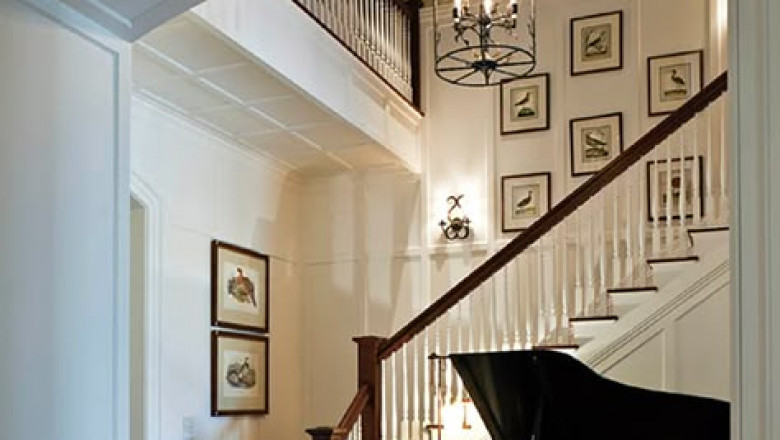views
Outdoor stair railings are a critical element of any exterior stair railing. They not only keep individuals safe who are walking up and down the stairs, but also play an important role in the overall curb appeal and appearance of your house. From porches to garden steps and backyard decks, an expertly selected exterior railing can completely change the appearance and atmosphere of your environment.
In this guide, we’ll explore the importance of exterior stair railings, popular material options, design styles, installation tips, and maintenance advice.
Why Exterior Stair Railings Matter
1. Safety First
The most important function of any outdoor stair railing is safety. Exteriors steps can be slippery from rain, snow, or ice and therefore must have strong railings to prevent slipping and falling. Most building codes require handrails on exterior stairs with a minimum of a few risers (usually three or more). When building new steps or redecorating a staircase, the addition of a railing provides safety for homeowners and visitors of all ages.
2. Adds Curb Appeal
In addition to functionality, exterior stair railings add beauty to the front of your home. A well-designed choice can accentuate architectural features, reflect your personality, and make your home inviting. Think of your railing as an accessory—it must complement your home, not fight against it.
3. Adds Property Value
Replacing your outdoor stair railing can also add value to your property. Home buyers appreciate added safety features, and a stylish, well-maintained railing can be a selling point at resale. It shows attention to detail and commitment to form and function.
Most Popular Materials for Exterior Railings
1. Wrought Iron
Respected for its power and timeless beauty, wrought iron is commonly used for exterior railings. It can be shaped into intricate or modern patterns and is quite durable when properly treated to withstand corrosion.
2. Aluminum
Aluminum railings are lightweight and corrosion-resistant, making them ideal for homeowners who want a low-maintenance solution. They are offered in a variety of powder-coated colors and often mimic the look of more expensive materials at a fraction of the cost.
3. Wood
Wood railings provide a warm, traditional look, especially on cabins, porches, or houses that are craftsman-style. They must be sealed, stained, or painted regularly to withstand the weather and rot.
4. Vinyl
Vinyl railings are inexpensive, easy to maintain, and extremely weather-resistant. These are perfect for homeowners that do not wish to have the maintenance of wood, but a clean, white, nice finish.
5. Stainless Steel or Cable Railings
For a modern, sleek look, cable railings or stainless steel railings are excellent options. They provide a minimalist, unobstructed appearance and are especially desired for view decks or stairways, as they don't obstruct sightlines.
Best Exterior Stair Railing Styles
1. Classic Vertical Balusters
A classic look with tightly spaced vertical balusters (or spindles) suits most house designs. It's simple, functional, and simple to pair with other materials.
2. Horizontal Cable or Rods
A more open and contemporary appearance, this design is used in coastal or modern homes. Stainless steel cable or rod horizontally spans between posts for a clean appearance.
3. Decorative Ironwork
Wrought iron is curved into scrolls, flowers, or geometric forms. These are used primarily for the application of old homes or to provide a dash of decoration for classic houses.
4. Glass Panels
While more typical on balconies and decks, glass panel railings can be used on stairs as well. They provide unobstructed views and an upscale, contemporary look, particularly when combined with metal posts.
Installation Tips
When installing new railings or replacing existing ones, keep these suggestions in mind:
Know the Code: Building codes in your area specify the minimum height, spacing, and handrail location for stair railings. Check regulations first.
Secure Anchoring: Posts should be securely anchored into the steps or structure for long-term stability.
Professional vs. DIY: While some railings (like vinyl or aluminum kits) are DIY-supplied, others—especially custom ironwork—should be professionally done for quality and safety.
Maintenance and Care
Railings outside have to endure all year-round elements, so maintenance has to be regular:
Clean Regularly: Clean with soap and water to remove dirt and debris.
Inspect Annually: For loose fasteners, patches of rust, or damage.
Seal and Paint: Wood railings should be sealed or painted every 1–2 years. Metal railings should be touched up or coated with protective coverings to prevent corrosion.
Replace When Needed: If your railing is wobbly, heavily rusted, or rotting, it's time for a replacement.
Choosing the Right Railing for Your Home
When selecting a railing, remember:
Your Home's Style: Match materials and designs to your home's style—modern homes can employ bright steel, but cottages love wood or ornamented iron.
Your Budget: Vinyl and aluminum are less costly, while wrought iron and glass are costly ones.
Your Lifestyle: If you want low-maintenance, avoid high-maintenance materials like untreated wood.
Final Thoughts
Outdoor stair railings protect more than just your safety— they frame the look of your front door and add character to your house. With so many styles, materials, and finishes to choose from, it's easy to find a railing that adds to the safety and beauty of your house.
Whether you’re after something decorative, functional, or a bit of both, investing in quality exterior stair railings is a smart move that pays off in value, safety, and style.














Comments
0 comment